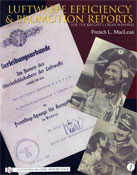Rudolf Abrahamczik, “Exemplary willingness for combat and risk-taking.”
Herbert Bachnick, “Temperamental character, sometimes a little flippant.”
Josef Barmetler, “With a good talent for comprehension and a talent for clear judgment.”
Viktor Bauer, “The squadron under his command did not lose a single pilot through enemy action.”
Ludwig Becker, “His lack of talent for improvisation and quick decision-making are disturbing.”
Friedrich Beckh, “He is never satisfied with his own accomplishments.”
Hans Beisswenger, “He enjoys the full confidence of the other pilots.”
Hans-Wilhelm Bertram, “Demonstrates courage paired with calculation and logical thinking.”
Heinrich Boecker, “Goal-oriented.”
Rudolf Boehlein, “He has endurance and is tough.”
Rudolf Böhmler, “He is firm during a crisis and prevails with an iron tranquility.”
Hans-Joachim Brand, “The proof of descent from German or related blood of Hans-Joachim Brand and his spouse has been obtained.”
Werner Breese, “Passionate pilot.”
Gerhard Brenner, “Demonstrated superhuman accomplishments.”
Max Buchholz, “Toward the men under his command strict, but always correct.”
Kurt Bühligen, “He possesses élan.”
Horst Carganico, “Personal courage and daring in combat.”
Wilhelm Crinius, “He is tough, but he fights with calculation and deliberation.”
Adolf Dickfeld, “He sometimes tends towards high-handedness.”
Erwin Diekwisch, “One can always trust him.”
Anton Döbele, “He can be harsh and one-sided in judging the people around him.”
Alfred Druschel, “Distinct talent for improvisation.”
Hans Ehlers, “Of particular note is that on October 8, 1943, after he had completely depleted his ammunition, he rammed a four-engine bomber.”
Siegfried Engfer, “His appearance is modest and reserved.”
Waldemar Felgenhauer, “Not totally free of personal ambition.”
Leopold Fellerer, “Untiring willingness for action, coupled with an iron will for victory.”
Karl Fitzner, “Mentally very alert with the best ability to comprehend.”
Erwin Fleig, “As an acting squadron commander, he is an exemplary officer on the ground and in the air.”
Ernst Frömming, “Over Crete, he conducted his first jump into enemy territory, without prior training.”
Wilhelm Fulda, “While with the 3rd Squadron, Air-Landing Wing, he received the Knight’s Cross of the Iron Cross from the Führer due to his courage in combat.”
Robert Gast, “Alert and open to new ideas.”
Siegfried Gerstner, “A healthy degree of self-confidence and ambition.”
Walter Gericke, “Major Gericke has fully proven himself as a battalion commander.”
Franz Grassmel, “Sometimes a little stubborn.”
Alfred Gross, “Keeps rather to himself.”
Hans Grünberg, “In his nature are hidden leadership qualities.”
Andreas Hagl, “He is no longer able to withstand the hardships of war.”
Reino Hamer, “He sweeps the men under his command along with him.”
Friedrich-August von der Heydte, “Distinguished himself through prudent leadership of his battalion and ruthless personal action.”
Herbert von Hoffer, “He is very sensitive, easily becomes nervous.”
Franz Hrdlicka, “He has read the Führer’s Mein Kampf.”
Eberhard Jacob, “Man of character.”
Karl Janke, “He lacks the talent to sweep the soldiers along with him and to create enthusiasm for something.”
Peter Jenne, “Unwavering spirit for battle.”
Karl Kennel, “He is well liked due to his calm, but also humorous and very friendly manner.”
Alfred Kindler, “He is an example for his squadron.”
August Lambert, “He was mentioned several times in official Wehrmacht dispatches.”
Emil Lang, “Demands of himself first.”
Karl-Heinz Langer, “After the encirclement of Stalingrad, showed unusual courage on numerous combat missions out of the fortress.”
Erich Leie, “Has excelled in his current assignment.”
Ludwig Leingärtner, “Has fully distinguished himself as an officer with great willingness for combat against the enemy.”
Lothar Linke, “Possesses good social manners.”
Helmut Lipfert, “He is a shining example for his squadron.”
